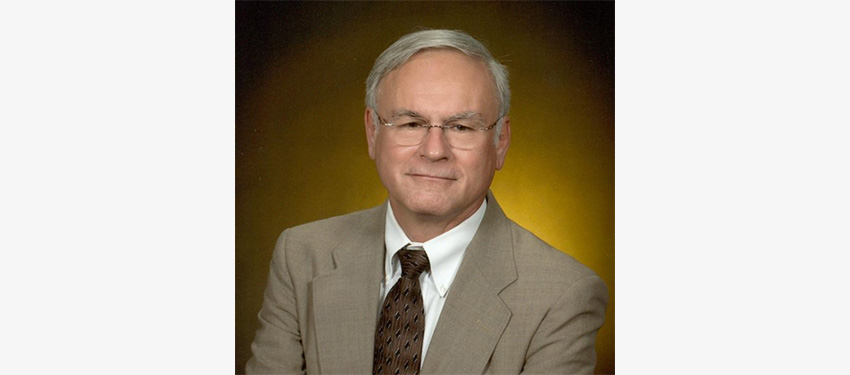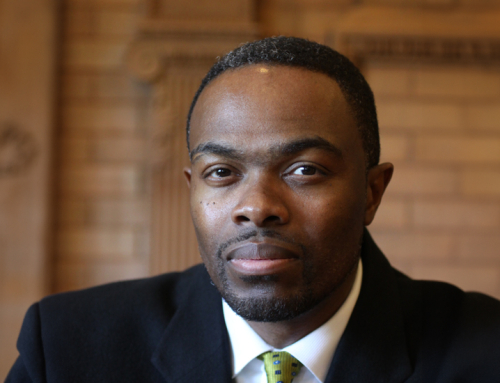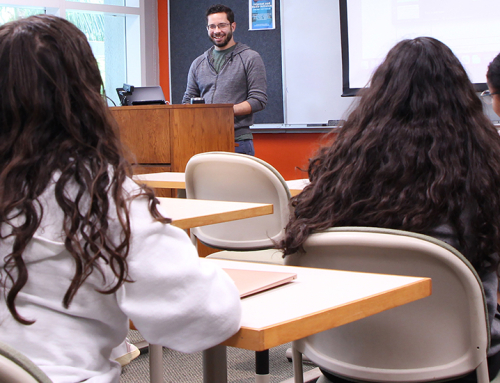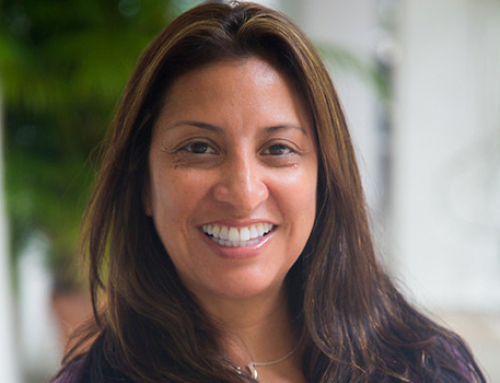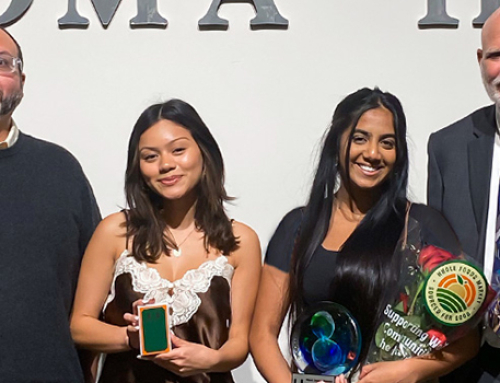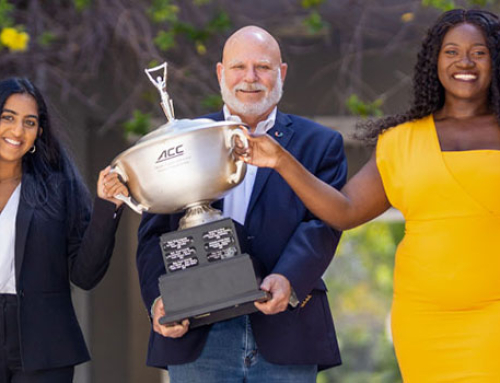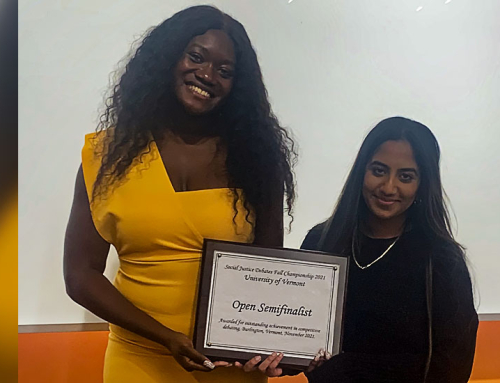Several professors, Ph.D. students, and alumnae from the University of Miami School of Communication received awards and recognition at the National Communication Association’s (NCA) 101st Annual Convention in November.
Professors Dr. Susan Morgan, Dr. Nick Carcioppolo, Dr. Don Stacks, and Dr. Diane Millette, Ph.D. candidate Elena Chudnovskaya, and alumnae Dr. Qinghua “Candy” Yang and Dr. Zongchao “Cathy” Li were acknowledged for their outstanding research in the field of communication.
Dr. Susan Morgan received the NCA Distinguished Health Communication Scholar Award, which recognizes a lifetime of achievement in the area of human communication. Dr. Morgan spent the past 12 years working in the area of organ donation. Her interest in this field began in Spain, the leading country in organ donation. While working at the University of Barcelona, Dr. Morgan collaborated with colleagues who helped create policies positioning Spain at the top of world organ donations. Dr. Morgan co-authored multiple research projects with Dr. Marti Manyalich, a distinguished leader in the area of organ donation, as well as helped to educate medical students at the University regarding approaches toward public education in organ donation.
“The organ donation research was very successful in increasing people’s willingness to donate after they die,” Morgan said.
“It’s marvelous,” Morgan said. “It’s nice to be recognized, but it’s also recognition of how the field really values applied research and actually making a difference in people’s lives.”
Dr. Morgan hopes this award will bring attention to all the important research being done by health communication faculty in the School.
Dr. Nick Carcioppolo and Dr. Morgan received the NCA Golden Anniversary Monograph Award for the article, “Comparing Tailored and Narrative Worksite Interventions at Increasing Colonoscopy Adherence in Adults 50 – 75: A Randomized Controlled Trial,” published in Social Science & Medicine. Together with Purdue University graduate students, Jakob Jensen, Andy King, Melinda Krakow, and N. Jewel Samadder, different types of messages were tested to persuade people to comply with colonoscopy recommendations. Results indicated that hospital and blue-collar workers were groups least likely to get screened. Two types of intervention material were found to be more effective than traditional pamphlets distributed in doctors’ offices. The first method was to interview individuals to determine what prevents them from getting a colonoscopy and their beliefs about cancer, then provide personalized guides tailored to these responses. The second method was providing narratives of individual’s experiences being screened with embedded persuasive messages.
Dr. Carcioppolo noted, “A brief overview of what we found was that including any narrative whatsoever in the materials was four times more effective than any other type of materials.” The research team was not expecting to find such significant results.
“It’s fun to put in so much work on a project like that and then to get some recognition for it,” Carcioppolo said.
Dr. Carcioppolo became interested in health communication as a graduate student in a cancer communication course that helped him realize what researchers could do to help solve important problems. He has been teaching health communication courses at UM since 2013, and also directs the School’s Cancer Communication Lab.
Dr. Qinghua “Candy” Yang, received her doctorate from UM, and was awarded Top Paper in Health Communication Division with co-author Dr. Diane Millette, for their research, “Does Interactivity Help? A Meta-Analytic Review of Web-Based Interactive Health Interventions.”
“I feel extremely lucky and honored that our work was recognized,” Yang said.
One of Yang’s primary research interests is computer-mediated health communication.
“I’m particularly interested in how features enabled by new media and technology influence and, if applied appropriately, facilitate health communication,” Yang said.
Dr. Yang is currently a postdoctoral research fellow at UPenn Tobacco Center of Regulatory Science at the University of Pennsylvania, Annenberg School for Communication. In Pennsylvania, Yang is analyzing large data sets collected over multiple years for tobacco-related messages on different media platforms. This research is being funded by the National Institutes of Health and FDA’s Center for Tobacco Products.
The Health Communication Division is one of the largest and most competitive in NCA. Receiving distinguished research awards and top papers in this Division demonstrates the quality of health communication research being conducted at the School of Communication.
“It is extremely important for Dr. Yang and our doctoral students to be recognized at our national association for doing comprehensive research in their chosen areas,” Millette said.
Dr. Millette also received Top Paper in Communication Apprehension and Competence Division for research, “The Impact of Reticence on Usage of Text Messaging for Everyday Talk,” with co-authors Dr. James Keaton (University of Northern Colorado) and Dr. Lynne Kelly (University of Hartford).
Dr. Don Stacks and Dr. Zongchao “Cathy” Li received Top Faculty Paper in the Public Relations Division for their research, “Does Power Make Us Mean? An Investigation of Empowerment and Revenge Behaviors in the Cyberspace.” Dr. Stacks is also Editor of the journal, Communication Research Reports. Dr. Li is currently at University of South Carolina.
Elena Chudnovskaya received Top Student Paper in Association for Business Communication with co-author Dr. Laura O’Hara from Ball State University for their research, “Indulgence versus Restraint in Russia: Reflections on a New Cultural Dimension.”
“I felt very honored and privileged to present my paper co-authored with Dr. Laura O’Hara at NCA’s Annual Convention. It was a unique opportunity for me to share my knowledge and learn from other students in the area of cross-cultural and organizational communication. I am sincerely grateful to Dr. Michael Beatty and Dr. Diane Millette for their encouragement and great support during development of this project,” said Chudnovskaya.
Dean Gregory J. Shepherd of the School of Communication noted how important communication research is for all areas of life.
“All around the world I think people are recognizing that communication and understanding communication and mastering communication is key to making a difference in all the areas of healthy living, healthy behavior, disease management, anything that has to do with health,” Shepherd said.
Shepherd added that the NCA Annual Convention is the largest gathering of communication educators and scholars, so these awards will bring a great deal of positive attention to the School of Communication.
“It’s wonderful,” Shepherd said. “I’m tremendously proud of my faculty, alumnae, and Ph.D. students for getting those awards.”
